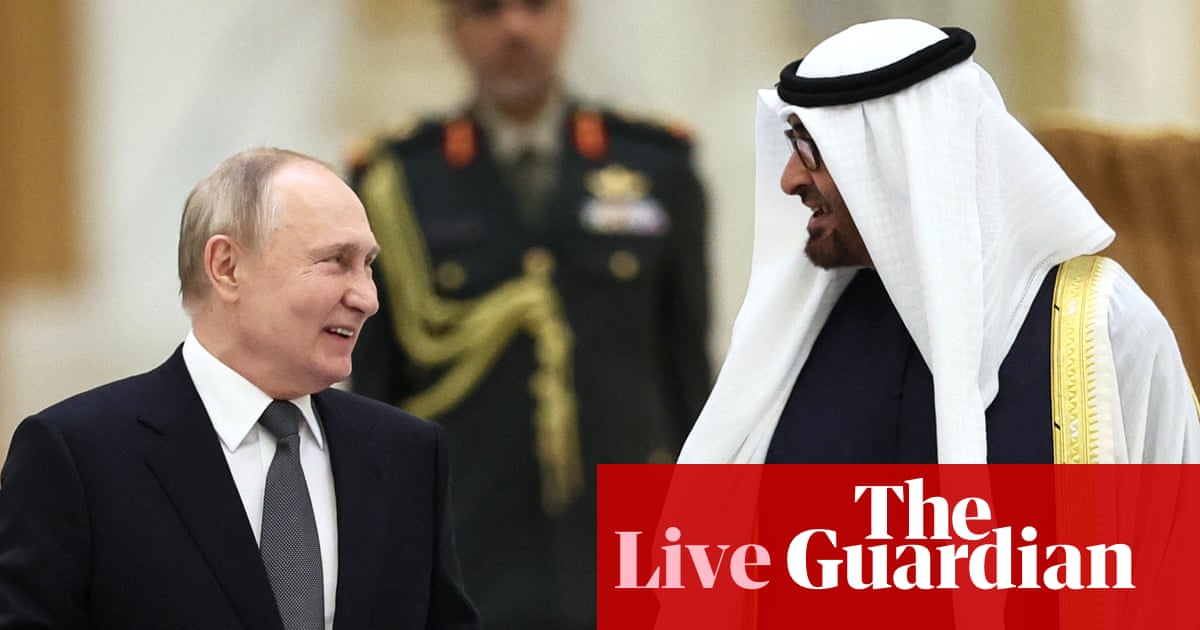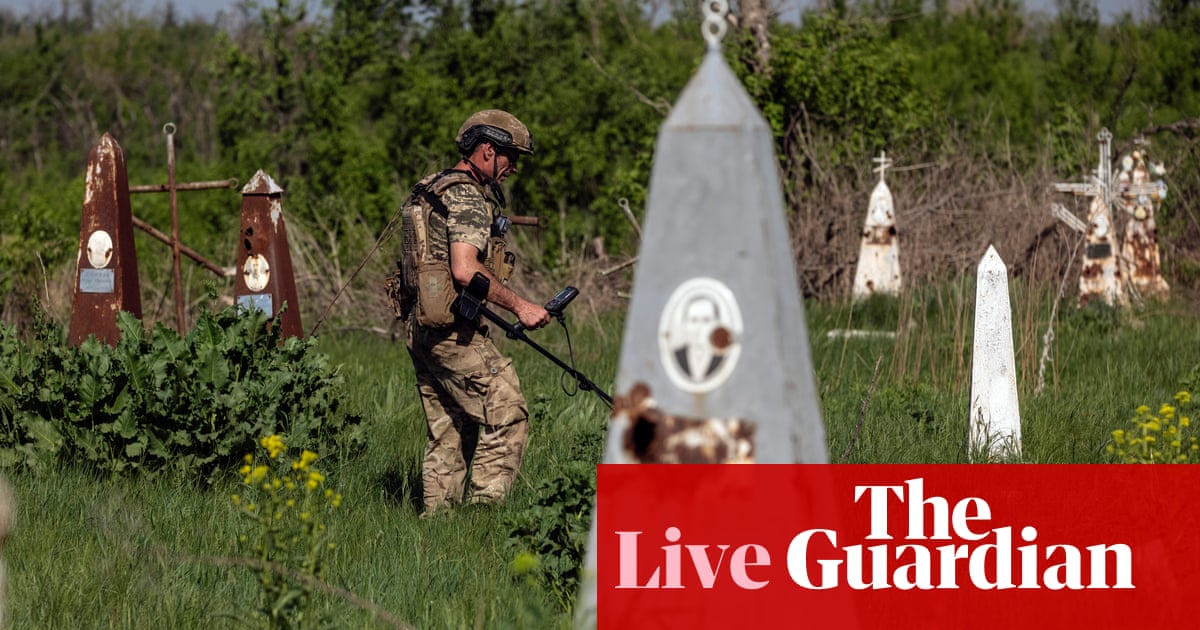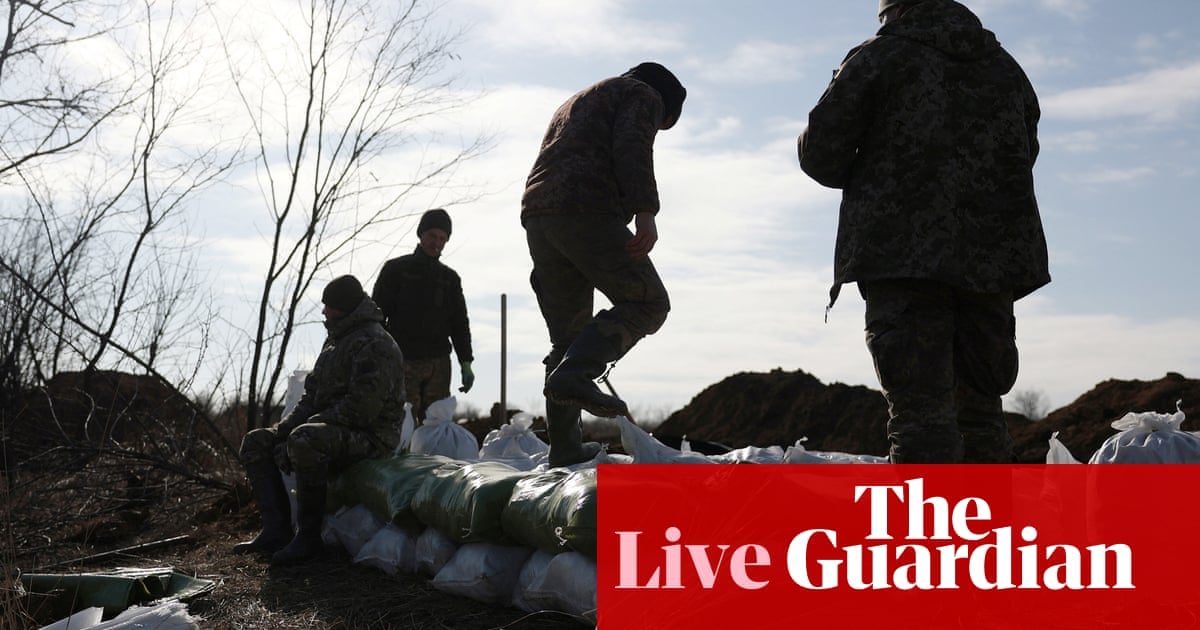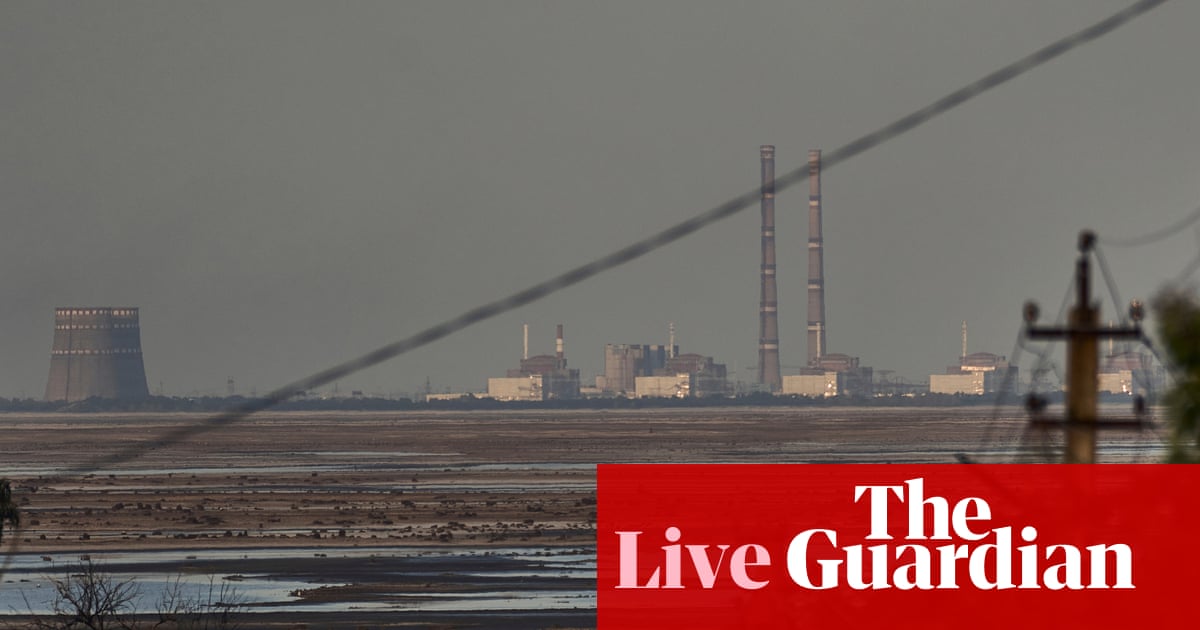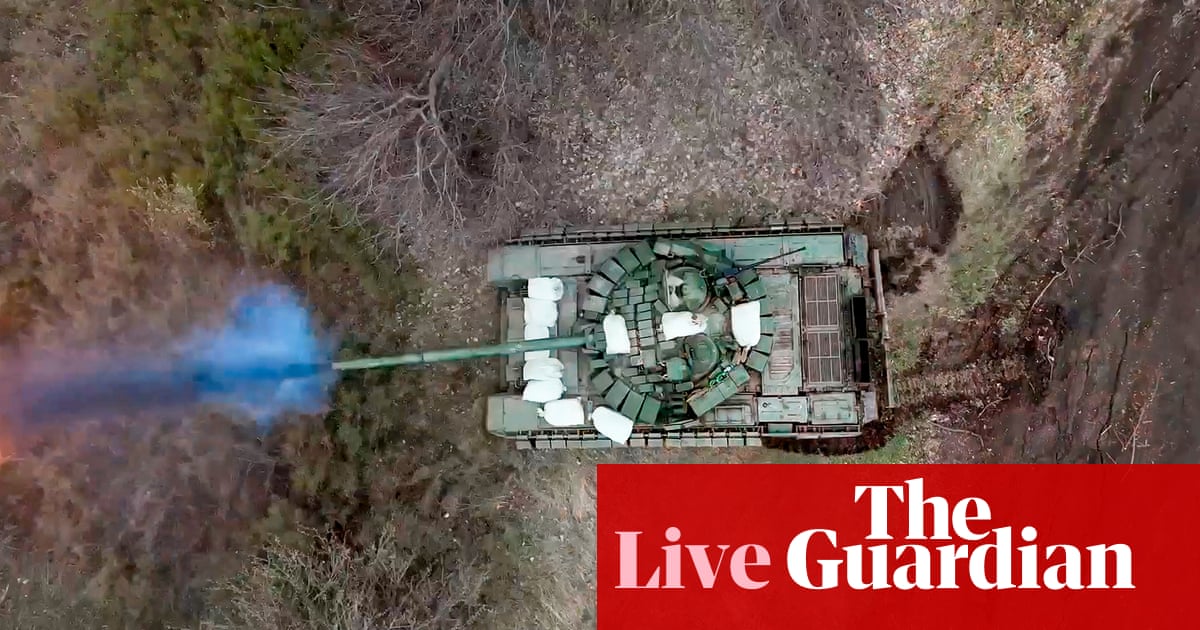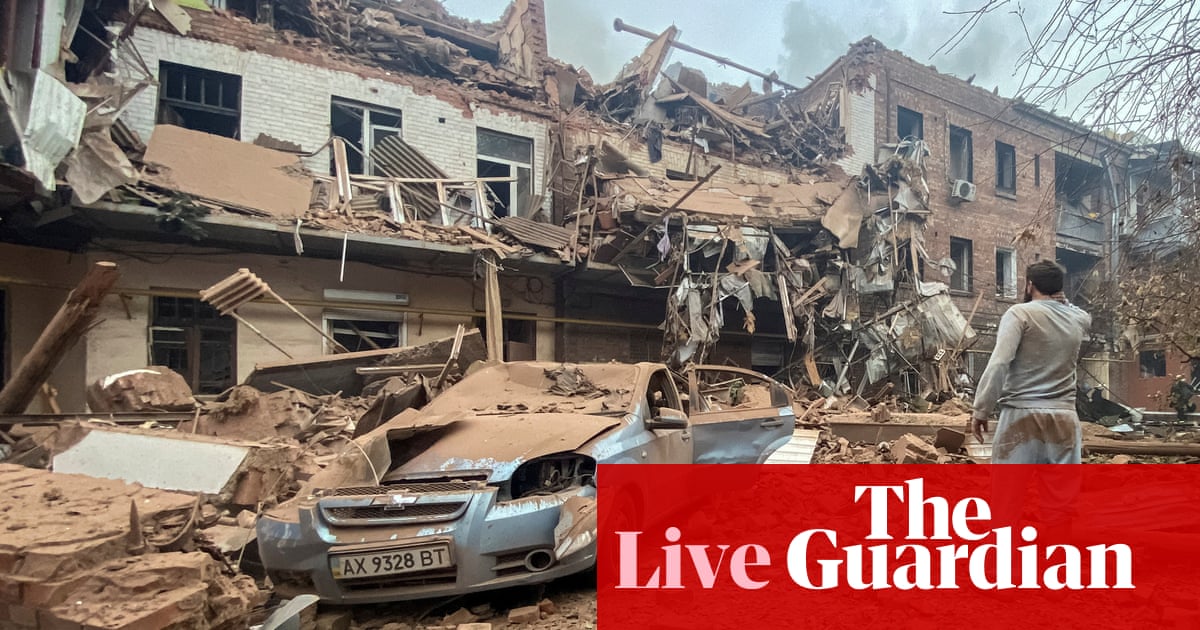
‘All of you are war criminals’: activist disrupts Russian event at Cop27
The Russian Federation’s event at Cop27 was dramatic, write Damian Carrington and Nina Lakhani, and notable for two things: the shouts of “war criminals” and the complete absence of any discussion of the nation’s oil and gas production. The latter is despite Russia being the second biggest oil and gas producer in the world, and carbon emissions from fossil fuels being the overwhelming cause of the climate crisis.
The event began with protesters repeatedly shouting “you are war criminals”, before being swiftly removed from the room. “The event is about the climate agenda, not the political agenda,” the chair said. However, in the 75 minutes that followed, the role of fossil fuels was not mentioned by the six men who comprised the panel.
Sergei Anoprienko, the deputy environment minister, spoke first about the economic damage being caused by melting permafrost and about eliminating refuse landfill sites. Kirill Komarov, from the state-owned nuclear company Rosatom, spoke at length about Russia’s nuclear power capabilities. He said “the arguments against nuclear are very often coloured politically and are emotional”, and that a floating nuclear power plant in a remote peninsula had allowed “children to see for the first time that snow can be white”.
A scientific adviser to the Russian president, Vladimir Putin, talked about monitoring greenhouse gases and a special breed of poplar tree that could absorb more carbon as it grew.
Also on the panel was Vyacheslav Fetisov, the UN Environment Programme’s goodwill ambassador for Russia, a deputy in the Russian Duma and a former ice hockey star, who spoke about the need to preserve access to water. He also railed against the sanctions imposed on Russia after it invaded Ukraine: “We are ready to cooperate but we are hit with sanctions, which includes green and energy-saving technology. I don’t understand.”
As the event turned to questions, the BBC’s climate editor Justin Rowlatt approached the stage with a camera operator, asking: “Are you going to pay for the environmental damage you have caused in Ukraine?”, as a result of the invasion, but was quickly removed from the room.
The final question from the audience was what Russia thought about India’s proposal to include the need to “phase down all fossil fuels” in Cop27’s final decision text, rather than just “phase down coal” as was in the Glasgow pact agreed at Cop26. This produced the gnomic response: “Coal is still alive, so let us wait.”
The panellists had described Russia as a “climate responsible” nation. But the event provided little evidence of that.
Asked later why she had disrupted the event, the Ukrainian activist Svitlana Romanko, from Razom We Stand, said: “I am glad that I named evil by name and I was able to tell them what all Ukrainians would like to tell them if they were here. You are a terrorist state, you are genociding, torturing and killing us daily for nine months, your oil and gas are killing us. You are war criminals, you must not be here but in international court.”
What happened at Cop27: day eight
Here’s a summary of key events at Cop27 on Tuesday:
The Cop talks have been dominated by fears that countries are backsliding on their commitments to tackle the climate crisis, as the first tentative drafts started to emerge of key potential decisions. The situation is still highly fluid, but pledges on 1.5C, on funding for adaptation, and on the $100bn that was pledged to be delivered by rich countries by 2020 are being picked over.
The British-Egyptian political prisoner Alaa Abd el-Fattah has broken his hunger strike, his sister has confirmed. Sanaa Seif, who spoke at Cop27 last week, tweeted that she had received a letter from her brother, which said he would “explain everything” on Thursday when his family visits.
Indonesia, the world’s 5th largest greenhouse gas emitter, will be helped with $20bn (about £17bn) of public and private finance to shut coal power plants, the US, Japan and partners have announced. Experts called for transparency and respect for human rights to be built into the deal.
The Guardian and more than 30 international media titles in more than 20 countries have published a joint editorial calling for radical thinking on how to fund climate action. Katharine Viner, the editor-in-chief of the Guardian, which led the initiative, said: “With Cop27 taking place in Egypt, we wanted to publish an ambitious editorial that highlights how strongly many different news organisations, and our readers, feel about the climate crisis.”
Thank you for reading the Guardian’s Cop27 blog – it is closing now. I’m Natalie Hanman, the Guardian’s head of environment, and we will be back here with all the latest twists and turns of the negotiations when the summit resumes on Wednesday. To share tips, ideas or feedback, please contact me on natalie.hanman@theguardian.com or @nataliehanman
‘All of you are war criminals’: activist disrupts Russian event at Cop27
The Russian Federation’s event at Cop27 was dramatic, write Damian Carrington and Nina Lakhani, and notable for two things: the shouts of “war criminals” and the complete absence of any discussion of the nation’s oil and gas production. The latter is despite Russia being the second biggest oil and gas producer in the world, and carbon emissions from fossil fuels being the overwhelming cause of the climate crisis.
The event began with protesters repeatedly shouting “you are war criminals”, before being swiftly removed from the room. “The event is about the climate agenda, not the political agenda,” the chair said. However, in the 75 minutes that followed, the role of fossil fuels was not mentioned by the six men who comprised the panel.
Sergei Anoprienko, the deputy environment minister, spoke first about the economic damage being caused by melting permafrost and about eliminating refuse landfill sites. Kirill Komarov, from the state-owned nuclear company Rosatom, spoke at length about Russia’s nuclear power capabilities. He said “the arguments against nuclear are very often coloured politically and are emotional”, and that a floating nuclear power plant in a remote peninsula had allowed “children to see for the first time that snow can be white”.
A scientific adviser to the Russian president, Vladimir Putin, talked about monitoring greenhouse gases and a special breed of poplar tree that could absorb more carbon as it grew.
Also on the panel was Vyacheslav Fetisov, the UN Environment Programme’s goodwill ambassador for Russia, a deputy in the Russian Duma and a former ice hockey star, who spoke about the need to preserve access to water. He also railed against the sanctions imposed on Russia after it invaded Ukraine: “We are ready to cooperate but we are hit with sanctions, which includes green and energy-saving technology. I don’t understand.”
As the event turned to questions, the BBC’s climate editor Justin Rowlatt approached the stage with a camera operator, asking: “Are you going to pay for the environmental damage you have caused in Ukraine?”, as a result of the invasion, but was quickly removed from the room.
The final question from the audience was what Russia thought about India’s proposal to include the need to “phase down all fossil fuels” in Cop27’s final decision text, rather than just “phase down coal” as was in the Glasgow pact agreed at Cop26. This produced the gnomic response: “Coal is still alive, so let us wait.”
The panellists had described Russia as a “climate responsible” nation. But the event provided little evidence of that.
Asked later why she had disrupted the event, the Ukrainian activist Svitlana Romanko, from Razom We Stand, said: “I am glad that I named evil by name and I was able to tell them what all Ukrainians would like to tell them if they were here. You are a terrorist state, you are genociding, torturing and killing us daily for nine months, your oil and gas are killing us. You are war criminals, you must not be here but in international court.”
Fears countries backsliding on commitments to 1.5C and climate finance
The Guardian’s environment editors, Fiona Harvey and Damian Carrington, as well as senior climate justice reporter Nina Lakhani, have written that the Cop talks on Tuesday have been dominated by fears that countries are backsliding on their commitments to tackle the climate crisis, as the first tentative drafts started to emerge of key potential decisions.
They write:
Governments are supposed to be building on pledges made last year at Cop26 in Glasgow. These include limiting global heating to 1.5C above pre-industrial levels, doubling the amount of financial assistance for poor countries to adapt to the impacts of extreme weather, and addressing the issue of loss and damage, which means financial assistance for countries stricken by climate disaster.
However, documents and proposals seen by the Guardian on Tuesday, and accounts from negotiating teams, showed some countries were attempting to unpick agreements and water down commitments.
Negotiators cautioned that the situation was still highly fluid, and threats by some to renege on previous promises may be merely a gambit at this early stage. Many countries may be setting out extreme negotiating positions on some issues in order to win concessions on others.
This feels potentially very alarming, but as one delegate says: “It’s all still up for grabs.”
The Guardian has seen the negotiating proposals on loss and damage submitted to the UN framework convention on climate change (UNFCCC) by the negotiating bloc of the G77 developing countries plus China, which this year is led by Pakistan.
It details the position of developing nations which centres around a new fund separate and additional to the current climate adaptation and mitigation funding facilities “to assist developing countries in meeting their costs of addressing non-economic and economic loss and damage associated with the adverse effects of climate change, including extreme weather events and slow onset events.”
It would create a 35-member transitional committee – with representatives from 20 developing and 15 developed countries – which would begin work in early 2023, to establish the “objectives, principles and operational modalities” of the new fund over the next year or two.
Harjeet Singh, head of global political strategy at Climate Action Network International, a network of civil society groups in countries around the world, lists what he thinks are the “must haves” of the G77 plus China proposal here.
At this stage in the Cop process, no firm conclusions can be drawn on what the end result of the negotiations will be.
But we know that loss and damage is for many climate vulnerable countries the most important and most contested aspect of the climate finance negotiations.
The G77 chief negotiator Nabeel Munir told the Guardian.
“There is 100% unity [in the G77] on this. We want a loss and damage facility established this year. We are pushing for this and not talking about compromises ... Loss and damage is the main banner headline for this Cop, we are not giving up. The rest of climate finance [adaptation and mitigation] is also slow moving but is in process.”
In contrast, developed countries such as the US, EU and Australia appear to want to keep talking before deciding on whether a new facility for loss and damage is warranted, and the G7 has been promoting the Global Shield insurance initiative as an alternative.
Frans Timmermans, vice-president of the European Commission, said the EU was supportive of talks on loss and damage but that there was not yet broad agreement among developed and developing countries on what form any new finance mechanism for loss and damage should take and how it should operate. He said:
“I don’t see today an agreement emerging on a new facility, but the EU is building bridges [with other countries].”
However, the EU does not seem wholly united. Earlier today, Swedish climate minister Romina Pourmokhtari said: “I don’t think we should develop a new fund.”
Which one well-known Swedish climate activist was not very happy about:
Translation: “Sweden opposes the creation of a fund for climate damages and thus complicates the negotiations on #COP27 . This fund would provide crucial support for those most affected – it is a matter of life and death for countless people.”
The Guardian’s south Asia correspondent, Hannah Ellis-Peterson, has written an interesting piece about India.
On the global stage, she writes, India presents itself as committed to clean energy and the environment. Yet at home, it makes no secret of the fact that it will need coal for decades to come, even as it increases its reliance on renewables and moves towards its net zero 2070 target. This has led to it walking a delicate balance as part of the Cop negotiations. Hannah writes:
“It was one of the most dramatic moments at the Cop26 climate talks in Glasgow last year when India, backed by China, made a last-minute intervention to water down the language of the final agreement, changing the commitment to “phase down” rather than “phase out” coal power. Coal currently accounts for 70% of electricity generation in India, while renewables count for only about 12%.
At Cop27 this year, the Indian position has been to try to counter the pressure to reduce its continued reliance on coal by pushing for an agreement to phase down all fossil fuels, including gas, which Europe and the US are still heavily dependent on. India’s argument is that it is unfair to single out coal – which is primarily used by developing countries – while other fossil fuels widely used in western countries remain unsanctioned. Speaking on Monday, the environment minister, Bhupender Yadav, who is representing India at Cop27, accused developed nations of ‘turning back to fossil fuels’ as the energy crisis hit.”
Want to know what it’s like inside Cop27’s Green Zone? Here’s a dispatch from senior climate justice reporter, Nina Lakhani:
In an alternative universe, a mile or so south of the Blue Zone, aka the Sharm conference centre, a shiny over-the-top outdoor arts space with recycled wood benches is the Cop27 Green Zone. It’s a sprawling set-up with gawdy water fountains, exhibition tents, two dome-shaped event rooms and environmentally skewed art installations including a trio of metal sculptures representing the eyes of endangered species and a huge panda bear made from plastic containers.
The Egyptian Cop authorities had been keen that activism and dissent be confined to the Green Zone and a designated protest area somewhere in the desert, but that didn’t pan out, and this is primarily a place for those who weren’t able to secure accreditation for the main summit or are simply here doing business or promoting government and academic programmes.
Microsoft, Siemens and Vodafone are among the biggest multinationals drumming up business, while in the government tent bored-looking Egyptian women sell ceramics. It’s a hard gig, as visitors seem outnumbered by exhibitors, security guards and 600 unpaid volunteers including Eman Sabry, 24, an art director from Alexandria. “It’s been an amazing cultural experience meeting people from all over the world. We’re sad that it ends soon.”
Carbon markets were a hot topic in the finance and private sectors expo tents, with companies from India and the Gulf states among others promoting creative financial instruments and investments for carbon trading schemes that have been widely condemned by the climate justice movement as “bookkeeping scams” that do not reduce greenhouse gas emissions, but risk increasing land grabs and other human rights violations. In one exchange, CER10, an Egyptian consultancy firm that does environmental impact assessments for private clients, suggested that the new administrative capital is exempt from the regulations. The undisclosed environmental footprint of President Sisi’s pet project is one of the no-go research areas for environmentalists.
It’s not all corporations and art however. Chandrima Padmanabha from the Centre for Public Impact was attending a Unesco discussion on using open data to tackle misinformation and disinformation on climate change and Aya Khourshid was buzzing after participating in a panel on female leadership in agriculture and protecting the earth.
But for Vivian Siloli, 29, a gender specialist with the Indigenous Movement for Peace Advancement and Conflict Transformation (Impact) in northern Kenya confined to the green zone last week as her promised accreditation didn’t come through, the experience was disappointing.
I really missed out a lot … they make it so difficult for us, yet most of the matters discussed affect us Indigenous people directly or indirectly. In the green zone some days I didn’t find things that interested me from the agenda.
Her accreditation came through on Saturday, but she only had funding to stay for the first week.
It’s civil society day at Cop today but climate protests are continuing apace elsewhere too.
Climate activists in Austria have attacked a painting by Gustav Klimt, with one throwing a black, oily liquid at it and another gluing himself to the glass covering the painting, according to the Associated Press in Berlin.
Members of Letzte Generation Österreich (Last Generation Austria) tweeted that they had targeted the 1915 painting Death and Life at the Leopold Museum in Vienna to protest against their government’s use of fossil fuels.
After throwing the liquid on the painting, which was not damaged, one activist was pushed away by a museum guard while another glued his hand to the glass over the painting.
The group said activists were protesting against “oil and gas drilling”, which they called “a death sentence to society”.
In a video of the incident, which the group posted online, one of the activists can be heard shouting:
“We have known about the problem for 50 years – we must finally act, otherwise the planet will be broken.”
Mexico has announced plans to expand renewables – specifically, to deploy an additional 30GW of combined wind, solar, geothermal and hydroelectricity capacity by 2030, writes Nina Lakhani.
This national renewable goal “will be a foundation for achieving Mexico’s updated nationally determined contribution, including an unconditional target to reduce emissions by 35% from business-as-usual levels by 2030,” said the US embassy in Mexico. This is up from an unconditional pledge of 22% cuts from business-as-usual made two years ago. Mexico’s emissions are projected to continue rising until 2030.
Carlos Flores, an energy policy expert in Mexico, said that coming up with 30GW of new clean energy in eight years will be “almost impossible”.
Let’s break this down.
Since being elected in 2018, Andrés Manuel López Obrador (Amlo) has repeatedly tried to dismantle the 2013 energy reforms which gave renewables an advantage due to their low costs. And while he’s been thwarted by the courts, his policies and anti-renewables rhetoric has caused uncertainty and mistrust among investors. “While there is a global appetite for investing huge amounts in renewables, why would anyone come to Mexico after what Amlo has done,” said Flores. “Between 2010 and 2018, 14,000MW of renewables were built in Mexico. Today, with everything against them, how will they build more than double?”
Another sticking point is the transmission network, which is the responsibility of the national electricity commission. All expansion projects were halted after Amlo took office.
The 35% unconditional pledge may be good news, but it’s impossible to say given that Mexico will not define cuts in relation to a specific baseline year, only on a “business as usual” scenario.
Climate Action Tracker’s Mexico analyst, Maria Jose de Villafranca, from the NewClimate Institute, said: “President Lopez Obrador has largely focused on dismantling climate policies and prioritising fossil fuels. A stronger target would be welcome, but until we can understand what baseline he is using, we cannot quantify whether this announcement is an improvement.”
The Mexican government has been approached for comment.
On a side note, Amlo is among several G20 leaders from some of the biggest polluting nations that include Brazil, India, and Australia, who didn’t show up for Cop.
Leaked draft on "long-term climate finance" worries NGOs
The Guardian has seen a leaked copy of the “Draft Cop decision on long-term climate finance”. Much negotiation remains to be done before the document is finalised, but there are two specific points seriously worrying NGOs, as well as an overall lack of actual funding commitments. Increasing the delivery of climate finance from rich, polluting nations to poorer, vulnerable ones is a critical issue at Cop27.
The first point is on funding for adaptation, the measures to help cope with the increasingly severe impacts of extreme weather. The Glasgow Pact agreed at Cop26 a year ago had this text:
“Urges developed country Parties to at least double their collective provision of climate finance for adaptation to developing country Parties from 2019 levels by 2025”
But the draft text for Cop27 currently says:
“Urges developed country Parties to continue improving and scaling up adaptation finance, including by, as appropriate, considering doubling adaptation finance”
That watering down of the text is “extremely worrying and unacceptable”, according to Friederike Roder at Global Citizen.
The second point relates to the $100bn that was pledged to be delivered by rich countries by 2020 but has yet to be delivered.
The G20 declaration in Italy in October 2021 said:
“We note the Climate Finance Delivery Plan, which shows, based on OECD estimates, that the [$100bn] goal is expected to be met no later than 2023.”
The 2023 date was also in the “Climate finance delivery plan progress report” published just before Cop27 began. But this key date does not appear in the draft Cop27 text.
“The 100bn promise is left unmet for the second year in a row, but instead of pledging new money, the reference to striving to finally hit the target in 2023 is now completely gone,” said Roder.
She continued: “While it’s early days on a Cop cover decision, the first signs are far from promising. While efforts [described in the text] to increase transparency, to improve reporting and to agree on a common definition [of climate finance] are welcome, these cannot replace actual commitments. None of this excuses inaction – when will countries actually take responsibility?”
Today so far:
British-Egyptian prisoner Alaa Abd el-Fattah is eating again, his sister has confirmed. Sanaa Seif, who spoke at Cop27 last week, tweeted that she had received a letter from her brother.
It is not clear why the former hunger striker has broken his strike. The letter said he would “explain everything” on Thursday when his family visits.
Indonesia, the world’s 5th largest greenhouse gas emitter, will be helped with $20bn (about £17bn) of public and private finance to shut coal power plants and bring forward the sector’s peak emissions date by seven years to 2030, the US, Japan and partners have announced.
Experts called for transparency and respect for human rights to be built into the Indonesia deal.
The British climate minister Zac Goldsmith had an embarrassing run-in with an 11-year-old Indian activist. Licypriya Kangujam accused Goldsmith of running away from her questions on jailed climate protesters.
Concerns were raised about unhygienic and dangerous conditions for workers at the Cop27 summit after urine-filled bottles were found on site.
That’s it from me today. I’ll hand the blog over now to Natalie Hanman, the Guardian’s head of environment.
Countries need to move faster in shifting away from the use of coal as rapidly growing solar and wind industries will not be enough to hit climate goals, the International Energy Agency has said.
In a special report on coal, the IEA called for “immediate policy action” to finance a move away from the fuel, particularly in emergency and developing economies.
There are about 9,000 coal-fired power plants around the world, which vary significantly in age, from an average of 40 years old in the US to less than 15 years in developing economies in Asia.
The IEA said in a scenario in which current national climate pledges were met, output from existing coal-fired plants would need to fall by about one-third between 2021 and 2030, with 75% of it replaced by solar and wind. To hit net zero emissions by 2050 and limit global heating to 1.5C, coal use must fall by 90%.
Russia’s invasion of Ukraine has sent countries in Europe scurrying back to coal to ensure the security of energy supplies this winter. In the UK, three large coal-fired plants have been put on standby, although a pledge to phase out the use of coal by 2024 still stands.
IEA executive director Fatih Birol said:
Coal is both the single biggest source of CO2 emissions from energy and the single biggest source of electricity generation worldwide, which highlights the harm it is doing to our climate and the huge challenge of replacing it rapidly while ensuring energy security.
Reaction to the $20bn climate finance deal for Indonesia is pouring in from home and overseas, with experts unanimously calling for transparency and respect for human rights to be built into the deal.
Firdaus Cahyadi, the 350.org Indonesia team lead, said:
Indonesia’s energy transition will affect the lives of many people and communities. All discussion on the (Just Energy Transition Partnership) JETP deal should be transparent and involve communities most affected by the climate crisis. So far in Indonesia, these decisions have lacked transparency and if this conversation only involves the elite, it will become a space for false solutions from wealthy corporations.
Ahmad Ashov Birry from Trend Asi, said:
The JETP is important for solving the climate crisis… to ensure the success of these packages, there must be transparency on the details as well as genuine engagement and participation of civil society.
Indonesia is only the second country to announce a JETP deal. The first with South Africa was announced at Cop26 and has been subject to numerous issues including a lack of transparency around its financing. A similar deal with Vietnam is in the works.
Tata Mustasya, the head of the Climate and Energy Campaign of Greenpeace Indonesia, said the JETP could help accelerate the energy transition and signal that developed countries and recipient countries are translating commitment into implementation.
To meet the expectations, JETP should be conducted in a transparent, participatory and accountable manner and inline with a bigger regulatory framework that places clear and firm disincentives for coal and scalable incentives to clean and renewable energy and institutional reforms.
The Cop27 climate summit is not the only big UN environmental meeting at the end of 2022. Just two weeks after the conference ends in Egypt, the biodiversity Cop15 will begin in Montreal, Canada where countries will negotiate this decade’s targets for halting the destruction of the natural world. The process has been repeatedly delayed by the pandemic. The targets were meant to have been agreed in Kunming, China in 2020 but the nature summit has been moved due to their zero-Covid policy.
On Tuesday, on the sidelines of Cop15, ministers from more than 30 countries will meet in a hotel to discuss sticking points in negotiations. They include the high-profile target to protect 30% of land and sea, and the financial resources that will support the final agreement. China, Canada and the UN will co-host the meeting with ministers.
The EU’s commissioner for environment, oceans and fisheries, Virginijus Sinkevičius, tweeted a photo of a side meeting at Cop27 with UN biodiversity boss Elizabeth M. Mrema.
Here is the full letter, which appears to be in Alaa’s handwriting, according to the campaign to get him released:
4pm, Monday November 14th 2022
How are you, Mama? Don’t worry, I’m OK. Your short letter got through, and I feel better now knowing you’re OK. The mp3 [music player] got through too. I’ll see you on the visit day and tell you everything then and we’ll get back to long letters after the visit. The important thing is I want to celebrate my birthday with you on Thursday, I haven’t celebrated for a long time, and want to celebrate with my cellmates, so bring a cake, normal provisions, I’ve broken my strike. I’ll explain everything on Thursday.
Lots of love,
I miss you and long for your company,
British-Egyptian Alaa Abd el-Fattah is alive, breaks hunger strike, sister says
The sister of the jailed hunger striker Alaa Abd el-Fattah has confirmed her brother is alive and has broken his hunger strike.
Sanaa Seif, who spoke at Cop27 last week, tweeted that she had received a letter from her brother.
Seif posted a letter, purportedly written by Alaa, saying he would “explain everything” when his family visit is scheduled on Thursday.




